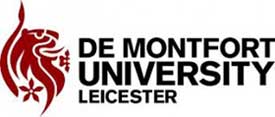Electrical Engineering courses
De Montfort University

- UK
- World Rank : 601
- Visit Website
Accredited by the Institution of Engineering and Technology (IET), this course puts you at the forefront of specialist areas of electrical and electronic engineering and will help you master a skillset that meets industry needs. You will study a range of core topics, including Electronic Circuits and Systems and Embedded Systems, and choose from optional modules, such as Mobile Communication and Advanced Power Electronics and Applications, to suit your ambitions.
Whether you opt for the three-year BEng or four-year integrated master’s MEng, our experienced staff will further your understanding of electrical and electronic engineering principles, and will also develop your design, research and project management skills.
In your third year you will focus on a substantial piece of individual research or product development work targeted to your interests, giving you the opportunity to showcase your understanding and skills.
Our dedicated facilities are divided into five main areas, each featuring experimental equipment – general electronics and assembly, digital electronics and microprocessor engineering, power electronics, control systems and communications engineering.
Graduates are working at national and multinational companies, including Airbus UK and Cummins UK, pursuing careers in electronic product design, radio frequency design and mobile communications, signal processing, control and power electronics, electronic control systems, telecommunications, military and aeronautical electronics.
Key features:
Entry Criteria
Plus five GCSEs at grade C or above, including English and Mathematics or equivalent.
Alternative qualifications include:
English language
If English is not your first language then an IELTS score of 6.0 overall with a minimum of 5.5 in each component (or equivalent) is essential.
| Type of Institution | Public |
| Campus Setting | Urban |
| Endowment | £1.17 million |
| Number of Campuses | 4 faculties |
| Number/Percentage of International Students | 23205 |
| Total number of Professors | 3240 |
| Student Satisfaction Rate | 86% |
| Graduate Job Rate | 97.3% |
| Number of Residence Vacancy | Around 3000 |
| International fee | Undergraduates- £13240 (annual) Postgraduates- £15950 (annual) |
| Number of Academic Programs | UG, PG, Part time, distance, blended |
| Mode of Program | Full time, distance and online |
| Average Graduate Salary | 19800 pounds a year |
| Field of Study | Avg.Fees |
|---|---|
| Art, Design and Humanities: | £13,750 |
| Business and Law | £13,750-£14,550 |
| Media | £13,750 - £14,250 |
| Engineering | £14,250 |
| Computing | £14,250 |
| Health and Life Sciences | £13,250 - £14,250 |
| Nursing BSc | £14,950 |
| Expenses | Estimated cost in pounds |
|---|---|
| Undergraduate tuition fee | 13,250- 14950 |
| Postgraduate tuition fee | 13600-15,900 |
| On campus accommodation | 5,000-6040 |
| Average cost of living | 97-110 per week |
DMU International Scholarship up to 1500 pounds
| Tuition Fees in UK (1st Year Average) | MS: £17276 | MBA: £17276 | BE/Btech: £16632 | BBA: £15130 | BSc: £16632 | MFin: £19000 | MA: £15560 | MIM: £18241 | MEM: £16950 | MArch: £14271 | BHM: £12662 | MIS: £15344 | MEng: £12876 | MBBS: £28865| MPharm: £15452 |
| Average Accomodation & Food Costs in UK | £850 to £1,050 a month |
| Entrance Exams in UK | TOEFL: 88 | IELTS: 6.5 | PTE: 59 | GMAT: 590 |
| Work and Study in UK | Permitted for 20 hours/week with a valid study permit. |
| Post Study Work Permit in UK | 2 Year after graduation depending on the course. |
| Cost of Student Visa in UK | £348 |
| Student Visa in UK | Your nationality, duration of your stay and purpose of your stay are the three essential factors for UK visa. For Non-EU students UK visa is mandatory. |
| Intakes in UK | There are mainly two intakes in UK: January/February & September/October. |
| Top Job Sectors in UK | IT Engineering, Product Design, Mobile Development, Designers, Logistics, etc. |
| Economy in UK | Growth Rate: 1.3% (2018) 1.4% (2019) 1.4% (2020e), 6th Largest Economy in the World by Nominal |
Tuition & fees :
£ 14,750
Hostel & Meals :
£ 6,063
Total
£ 20,813